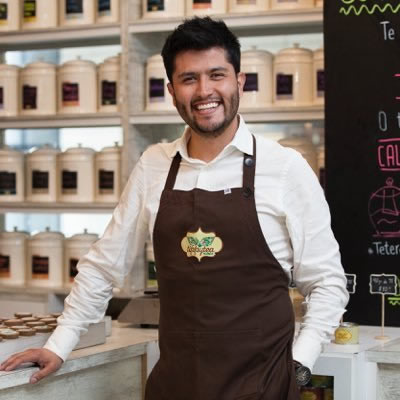Up to 250 families in the canton of Cotacachi in northern Ecuador are getting a fair price for the tea, herbs and fruit they grow as part of an innovative venture run by one of the finalists of UNCTAD’s Start-up for SDGs competition.
Tea is the most popular drink in the world after water – an estimated 70,000 cups are drunk every second, according to the Fairtrade Foundation – yet the sector is also among the most notorious for mistreating its workers.
But when 33-year-old Ecuadorian entrepreneur Guillermo Jarrin started Tippytea Blends, which produces, sells and distributes a range of artisanal teas and infusions using native Andean plants, he wanted to make a fair deal with his suppliers.
“The products are organic and fair trade certified,” Guillermo says.
“It means that normally there is already an established price for these kinds of herbs: we pay [more than] that price because we want to guarantee the quality and, of course, we want to be more generous with these families.”

Ancestral knowledge
Guillermo explains how he sources the ingredients for his blends.
“This community is formed of more or less 250 families,” he says. “The thing is that they have really small lands: they have their houses and they produce in their backyards.”
Much of the growing and harvesting is performed by women.
“We work regularly with 40 or 60 families that are represented by the mother,” Guillermo says.
Guillermo, a commercial engineering graduate of the Universidad de las Americas in Quito, decided to work with indigenous women to help protect the link between native plants and the cultural identity of the communities that harvest them for their health-giving properties.
“We want to share our history and rescue all the traditional and ancestral knowledge of these indigenous communities.
“Traditionally these communities use these herbs, fruits and teas to heal some kinds of problems.”
Among the fruit Guillermo includes in his blends is mortiño, a berry native to Ecuador a bit like a blueberry that’s said to soothe rheumatism, reduce fever, menstrual cramps and relieve symptoms of the flu.
“We want to share this with the world,” he says. “That is what we love about our tea products, and working with these people.”
Taste of the Andes
Guillermo’s drive comes from a boyhood familiarity with Ecuador’s traditional tea drinking culture, and a later fascination with blending unique flavours.
“I was very curious about tea and entrepreneurship, and I started to seek, to look, to study all about tea, and decided to study to become a tea sommelier,” Guillermo says. “Now it’s my life!”
In addition to local berries including uvillas, the native Andean goldenberries sometimes known as cape gooseberries or physalis, Tippytea Blends uses other plants that are native to the Andes mountains such as Andean chamomile, mint and lemongrass.
“Thanks to the exotic fruits and herbs that we have in our country, [our tea] is a value proposition that’s different to the teas of the world,” Guillermo says.
With its commitment to the “collection, production, transformation, and commercialization of goods and services derived from native biodiversity under the criteria of environmental, social and economic sustainability”, Tippytea Blends exemplifies a concept long championed by UNCTAD through its BioTrade Initiative.
Guillermo now wants to break into export markets so that Tippytea Blends can introduce native Ecuadorian flavours to the world.
“We want to be a representative brand of teas in the world, sharing our culture, sharing our identity, sharing our local products from Ecuador,” he says.
International recognition
Just four years after Guillermo founded Tippytea Blends, he began receiving international attention for his socially responsible business model.
Guillermo was the winner of the 2016 award for the most entrepreneurial start-up in Ecuador. The prize was awarded by a public-private partnership called Alianza para el Emprendimiento e Innovación (AEI).
“Last year we won [a prize for showing] the best entrepreneurship in Ecuador – thanks to the collaboration of UNCTAD and AEI… who helped us a lot,” Guillermo says.
In December 2017, Guillermo represented Ecuador at the United Nations Global Entrepreneurship Week: Start-Ups for the Sustainable Development Goals in Geneva, Switzerland, which featured ten projects from different parts of the world that showed how business and the goals could be aligned.
Tippytea Blends won the accolade because it contributes to achieving, among others, goal 15 on the sustainable use of terrestrial ecosystems, and its target 5 to protect natural habitats, and goal 11 on sustainable communities, particularly target 4 on protecting cultural and natural heritage.
“We came to Geneva to show and share our business model,” Guillermo says.
Fruitful collaboration
As well as giving a fair price to smallholders and protecting biodiversity and indigenous knowledge, this model targets young, urban and health-conscious consumers with sharp modern branding.
Fans can follow Tippytea Blends on social media such as Twitter and buy both tea and tea-making accessories online.
Tippytea also franchises four smart tea shops in Ecuador – three in Quito, one in Guayaquil – and sells its blends through high-end shops, hotels and restaurants.
“Next year we are trying to enter the ready-to-drink beverage market,” Guillermo says.
Guillermo’s success partly reflects the fruitful collaboration between UNCTAD and partners in Ecuador.
In 2015, AEI partnered with UNCTAD to prepare a national entrepreneurship strategy and related action plan. Since then, it has carried out an annual competition to award the most active implementer of the action plan from both the public and private sector.
In 2017, the AEI prize was awarded to Conquito, the national counterpart of Empretec, UNCTAD's flagship capacity-building programme for the promotion of entrepreneurship and micro-, small- and medium-sized enterprises in developing countries.
Empretec’s core product is the Entrepreneurship Training Workshop, which aims to promote self-confidence and motivate participants who have chosen to start or expand their businesses. It is based on a behavioural approach designed to unleash personal entrepreneurial potential.
Launched in Argentina in 1988, Empretec has since expanded to 40 developing countries and assisted 420,000 entrepreneurs.


